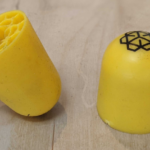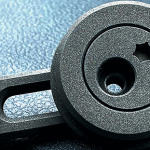- Home
- Company news
- 10 Factors To Consider when Selecting Your Prototyping Partner Or Bureau
10 Factors To Consider when Selecting Your Prototyping Partner Or Bureau
You’re a product, technology or engineering designer. Your current prototyping bureau has let you down, or can’t offer an overnight SLA or SLS job for you. Or maybe it’s time for a change and a completely new prototyping partner.
Whatever your circumstances, if you need a rapid prototyping or additive manufacturing partner to deliver SLAs, SLS, CNC or Vacuum Casting, selecting the right partner may at first seem a straightforward decision.
Yet looking beyond the primary factors of cost, speed and quality, a number of additional factors run a close second in the decision making stakes.
Much depends on the type of organisation you work for (design consultancy or manufacturer/OEM), how much and how often you need prototyping, and whether your organisation tends towards outsourcing or in-house investment.
If you do outsource, your choice of prototyping partner can be mission critical.
So here’s a list of factors to think about when considering the choice of prototyping partner
#1 Understanding of the product design, development and production process
Firstly, the best prototyping specialists understand the whole end-to-end production development process, from design concept through product design to prototyping to development, testing and on to production manufacturing.
They will be knowledgeable and experienced through these various phases of product development and expert in all the individual technical disciplines such as CAD and engineering.
Finally services such as SLA, SLS, CNC and vacuum casting should be complemented by the skills of prototyping engineers, model makers, toolmakers and finishers.
#2 Capacity
Yes it’s true. Size does matter.
The more investment your prototyping partner is making in new machines and technologies, the faster they’re going to be able to turn around orders for you.
If you need your RP part next day, and your selected partner has only 1 or 2 machines , the chances are they either won’t be able to deliver next day – or will need to outsource it to a 3rd party in order to meet your requirement.
While outsourcing is not in itself a problem, it does introduce an additional – and potentially weak – link into the chain, which could threaten the delivery schedule or quality of your part.
#3 Response time to quote requests
Actions speak louder than words. Lots of companies make grand promises about delivery and turnaround times, but do they walk the talk?
If you send an RFQ to your prototyping bureau which is not acknowledged or responded to within 2-3 working hours, how are they going to perform when delivering the actual part?
Look to work with prototyping companies that show you they respond quickly, as well as just say they do.
#4 Delivery on promises
For most product designers and consultancies, project timescales are very tight, and include very little flexibility for missed deadlines.
It’s absolutely vital that if your prototyping bureau says it can deliver next day by 11.00am it does just that. But how do you find out whether the promise will be kept?
Do your due diligence by looking around on your intended supplier’s website for testimonials and case studies from real people at real companies, and check for comments on their social media pages.
#5 Breadth of services offered
You may just need a quick 3D printing concept part today – but tomorrow you may want a fully working prototype model for presentation at a trade show or business meeting.
It’s so important to know if your prototyping partner is more than just a one-trick partner.
Ask how many types of 3D printing services they offer and what other services are also on offer. Also find out what finishing options such as smoothing, painting or laser cutting they can do.
If your chosen prototyping partner is a true specialist, they’ll have both modern and ‘traditional’ capabilities, with SLA and Vacuum Casting services under the same roof, alongside other 3D printing services and a CNC suite.
#6 Advice
If you’re not sure what kind of prototype process will produce the kind of geometries or properties you need for your part, there’s nothing wrong with asking for a bit of advice.
A fully clued-in, specialist prototyping bureau will be willing and able to offer you advice on choosing the right process – at no additional cost. They’ll also gladly offer you advice on material choice.
With the speed of development in rapid prototyping and 3D printing new materials which can mimic the properties of manufacturing or production materials, your prototyping partner should always offer you input, advice and options to help you achieve the results you want.
#7 Flexibility
How often have your left your prototype spec to the last moment and needed it producing urgently? This is where a truly reliable prototyping partner can come in to its own.
A last minute requirement can’t always be accommodated, but if it’s coming up to 5.00pm and you have an urgent need for a next-day RP part, how many prototyping bureaus are going to be able to step up and do it?
The value of a prototyping partner that’s willing to go the extra mile to process your urgent order late in the day, produce your job overnight and then deliver it to your office next day shouldn’t be underestimated.
#8 Specialist focus
Does your intended prototyping partner focus on prototyping as its primary business?
The prototyping bureau that focuses on prototyping, additive manufacturing and model making is a true specialist, and depends on its part quality, turnaround time, timeliness of response and accuracy of quoting for its continued existence.
If in its mix of services, your prototyping partner offers a range of prototyping, additive manufacturing, model making, milling and turning, tooling and finishing processes without sounding like it’s trying to be everything to everyone, it’s a specialist niche provider.
#9 Depth of experience
Industrial prototyping machines such as 3D printing machines require capital investment of many thousands, sometimes hundreds of thousands of pounds.
But cash investment is as nothing if not accompanied and complemented by deep and relevant experience.
The experience of a prototyping company’s employees is a major benefit to its clients, and a bureau that’s been in continuous business for decades is likely to have built up a vast bank of knowledge and experience that can be passed on as a benefit to clients.
#10 Approach to partnership
Successful prototyping companies want to be your partner. They will want to position themselves as an extension to your product design consultancy or OEM business, as a department even – and certainly, at minimum, as a partner.
They will also want to take responsibility for supporting you throughout your product development process, asking questions along the way, offering advice and managing your expectations carefully.
Crucially, they will invest in their relationship with you for the long term and will work hard to retain you as a client. As a consequence they will want your business not just once, but on an ongoing basis.
In conclusion:
The best prototyping service bureaus are specialists and offer a one-stop shop for all rapid prototyping, additive manufacturing, 3D printing, model making and finishing services for design consultancies and internal OEM design departments.
They will have in-depth knowledge and experience and be committed to delivering against the promises they make. And they will be flexible and accommodating in their approach.
GOT A 3D PRINTING REQUIREMENT?
Contact Prototype Projects on 01763 249760 or click here to request a quote.





